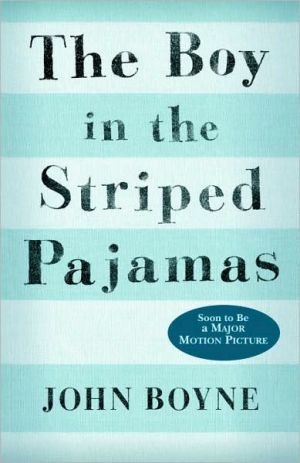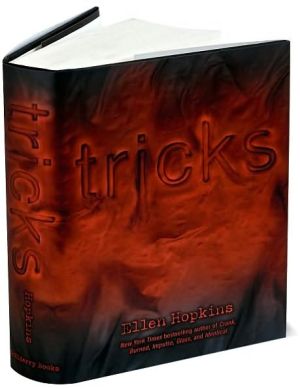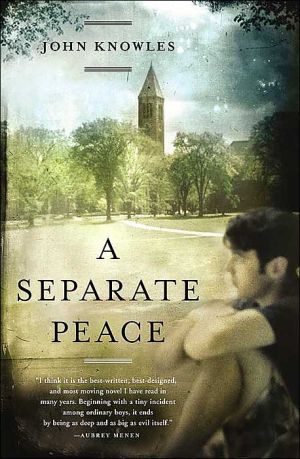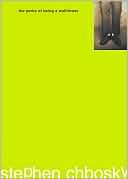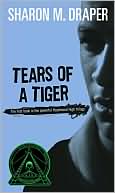The Boy in the Striped Pajamas
Berlin 1942\ When Bruno returns home from school one day, he discovers that his belongings are being packed in crates. His father has received a promotion and the family must move from their home to a new house far far away, where there is no one to play with and nothing to do. A tall fence running alongside stretches as far as the eye can see and cuts him off from the strange people he can see in the distance.\ But Bruno longs to be an explorer and decides that there must be more to this...
Search in google:
Guaranteed to spark discussion and debate this is a tale of two young boys experiencing the Holocaust from different perspectives and getting caught up in terrible events entirely beyond their control.When Bruno returns home from school one day, he discovers that his belongings are being packed in crates. His father has received a promotion and the family must move from their home to a new house far away, where there is no one to play with and nothing to do. A tall fence running alongside stretches as far as the eye can see and cuts him off from the strange people he can see in the distance. But Bruno longs to be an explorer and decides that there must be more to this desolate new place than meets the eye. While exploring his new environment, he meets another boy whose life and circumstances are very different from his own, and their meeting results in a friendship that has devastating consequences.Bonus Feature Author Interview with Editor, David FicklingPublishers WeeklyThrough the eyes of an innocent nine-year-old boy named Bruno, listeners become complicit bystanders, observing some of the horrors of the Holocaust. Maloney's soft-toned narration and chipper, believably childlike characterization of Bruno dramatically bring home the fable-like qualities of Boyne's moving text. Bruno's limited comprehension of all going on around him begs listeners, presumably with more knowledge than the protagonist, to glean the fuller story between the lines. When his father, an officer for "the Fury," as Bruno refers to him, is transferred from Berlin to a new post in Poland called "Out-With," Bruno and his family try to adjust. From his new bedroom window Bruno can see a fenced-in camp where all the inhabitants wear striped pajamas. He learns more about this intriguing place when he befriends a boy inside the camp named Shmuel (who happens to share Bruno's birthday). Their friendship progresses dangerously and brings Boyne's tale to a shocking end that is sure to be a discussion starter. A bonus interview between Boyne and his editor David Fickling is included. Ages 12-up. (Oct.) Copyright 2006 Reed Business Information.
The Boy in the Striped Pajamas\ \ By John Boyne \ David Fickling Books\ Copyright © 2006 John Boyne All right reserved.\ ISBN: 0385751060 \ \ \ Chapter One Bruno Makes a Discovery One afternoon, when Bruno came home from school, he was surprised to find Maria, the family's maid -- who always kept her head bowed and never looked up from the carpet -- standing in his bedroom, pulling all his belongings out of the wardrobe and packing them in four large wooden crates, even the things he'd hidden at the back that belonged to him and were nobody else's business. \ 'What are you doing?' he asked in as polite a tone as he could muster, for although he wasn't happy to come home and find someone going through his possessions, his mother had always told him that he was to treat Maria respectfully and not just imitate the way Father spoke to her. 'You take your hands off my things.'\ Maria shook her head and pointed towards the staircase behind him, where Bruno's mother had just appeared. She was a tall woman with long red hair that she bundled into a sort of net behind her head, and she was twisting her hands together nervously as if there was something she didn't want to have to say or something she didn't want to have to believe.\ 'Mother,' said Bruno, marching towards her, 'what's going on? Why is Maria going through my things?'\ 'She's packing them,' explained Mother.\ 'Packing them?' he asked, runningquickly through the events of the previous few days to consider whether he'd been particularly naughty or had used those words out loud that he wasn't allowed to use and was being sent away because of it. He couldn't think of anything though. In fact over the last few days he had behaved in a perfectly decent manner to everyone and couldn't remember causing any chaos at all. 'Why?' he asked then. 'What have I done?'\ Mother had walked into her own bedroom by then but Lars, the butler, was in there, packing her things too. She sighed and threw her hands in the air in frustration before march-ing back to the staircase, followed by Bruno, who wasn't going to let the matter drop without an explanation.\ 'Mother,' he insisted. 'What's going on? Are we moving?'\ 'Come downstairs with me,' said Mother, leading the way towards the large dining room where the Fury had been to dinner the week before. 'We'll talk down there.'\ Bruno ran downstairs and even passed her out on the staircase so that he was waiting in the dining room when she arrived. He looked at her without saying anything for a moment and thought to himself that she couldn't have applied her make-up correctly that morning because the rims of her eyes were more red than usual, like his own after he'd been causing chaos and got into trouble and ended up crying.\ 'Now, you don't have to worry, Bruno,' said Mother, sitting down in the chair where the beautiful blonde woman who had come to dinner with the Fury had sat and waved at him when Father closed the doors. 'In fact if anything it's going to be a great adventure.'\ 'What is?' he asked. 'Am I being sent away?'\ 'No, not just you,' she said, looking as if she might smile for a moment but thinking better of it. 'We all are. Your father and I, Gretel and you. All four of us.'\ Bruno thought about this and frowned. He wasn't particularly bothered if Gretel was being sent away because she was a Hopeless Case and caused nothing but trouble for him. But it seemed a little unfair that they all had to go with her.\ 'But where?' he asked. 'Where are we going exactly? Why can't we stay here?'\ 'Your father's job,' explained Mother. 'You know how important it is, don't you?'\ 'Yes, of course,' said Bruno, nodding his head, because there were always so many visitors to the house -- men in fantastic uniforms, women with typewriters that he had to keep his mucky hands off -- and they were always very polite to Father and told each other that he was a man to watch and that the Fury had big things in mind for him.\ 'Well, sometimes when someone is very important,' continued Mother, 'the man who employs him asks him to go somewhere else because there's a very special job that needs doing there.'\ 'What kind of job?' asked Bruno, because if he was honest with himself -- which he always tried to be -- he wasn't entirely sure what job Father did.\ In school they had talked about their fathers one day and Karl had said that his father was a greengrocer, which Bruno knew to be true because he ran the greengrocer's shop in the centre of town. And Daniel had said that his father was a teacher, which Bruno knew to be true because he taught the big boys who it was always wise to steer clear of. And Martin had said that his father was a chef, which Bruno knew to be true because he sometimes collected Martin from school and when he did he always wore a white smock and a tartan apron, as if he'd just stepped out of his kitchen.\ But when they asked Bruno what his father did he opened his mouth to tell them, then realized that he didn't know himself. All he could say was that his father was a man to watch and that the Fury had big things in mind for him. Oh, and that he had a fantastic uniform too.\ 'It's a very important job,' said Mother, hesitating for a moment. 'A job that needs a very special man to do it. You can understand that, can't you?'\ 'And we all have to go too?' asked Bruno.\ 'Of course we do,' said Mother. 'You wouldn't want Father to go to his new job on his own and be lonely there, would you?'\ 'I suppose not,' said Bruno.\ 'Father would miss us all terribly if we weren't with him,' she added.\ 'Who would he miss the most?' asked Bruno. 'Me or Gretel?'\ 'He would miss you both equally,' said Mother, for she was a great believer in not play-ing favourites, which Bruno respected, especially since he knew that he was her favourite really.\ 'But what about our house?' asked Bruno. 'Who's going to take care of it while we're gone?'\ Mother sighed and looked around the room as if she might never see it again. It was a very beautiful house and had five floors in total, if you included the basement, where Cook made all the food and Maria and Lars sat at the table argu-ing with each other and calling each other names that you weren't supposed to use. And if you added in the little room at the top of the house with the slanted windows where Bruno could see right across Berlin if he stood up on his tiptoes and held on to the frame tightly.\ 'We have to close up the house for now,' said Mother. 'But we'll come back to it someday.'\ 'And what about Cook?' asked Bruno. 'And Lars? And Maria? Are they not going to live in it?'\ 'They're coming with us,' explained Mother. 'But that's enough questions for now. Maybe you should go upstairs and help Maria with your packing.'\ Bruno stood up from the seat but didn't go anywhere. There were just a few more questions he needed to put to her before he could allow the matter to be settled.\ 'And how far away is it?' he asked. 'The new job, I mean. Is it further than a mile away?'\ 'Oh my,' said Mother with a laugh, although it was a strange kind of laugh because she didn't look happy and turned away from Bruno as if she didn't want him to see her face. 'Yes, Bruno,' she said. 'It's more than a mile away. Quite a lot more than that, in fact.'\ Bruno's eyes opened wide and his mouth made the shape of an O. He felt his arms stretching out at his sides like they did whenever something surprised him. 'You don't mean we're leaving Berlin?' he asked, gasping for air as he got the words out.\ 'I'm afraid so,' said Mother, nodding her head sadly. 'Your father's job is-'\ 'But what about school?' said Bruno, inter-rupting her, a thing he knew he was not supposed to do but which he felt he would be forgiven for on this occasion. 'And what about Karl and Daniel and Martin? How will they know where I am when we want to do things together?'\ 'You'll have to say goodbye to your friends for the time being,' said Mother. 'Although I'm sure you'll see them again in time. And don't interrupt your mother when she's talking, please,' she added, for although this was strange and unpleasant news, there was certainly no need for Bruno to break the rules of politeness which he had been taught.\ 'Say goodbye to them?' he asked, staring at her in surprise. 'Say goodbye to them?' he repeated, spluttering out the words as if his mouth was full of biscuits that he'd munched into tiny pieces but not actually swallowed yet. 'Say goodbye to Karl and Daniel and Martin?' he continued, his voice coming dangerously close to shouting, which was not allowed indoors. 'But they're my three best friends for life!'\ 'Oh, you'll make other friends,' said Mother, waving her hand in the air dismissively, as if the making of a boy's three best friends for life was an easy thing.\ 'But we had plans,' he protested.\ 'Plans?' asked Mother, raising an eyebrow. 'What sort of plans?'\ 'Well, that would be telling,' said Bruno, who could not reveal the exact nature of the plans -- which included causing a lot of chaos, especially in a few weeks' time when school finished for the summer holidays and they didn't have to spend all their time just making plans but could actually put them into effect instead.\ 'I'm sorry, Bruno,' said Mother, 'but your plans are just going to have to wait. We don't have a choice in this.'\ 'But, Mother!'\ 'Bruno, that's enough,' she said, snapping at him now and standing up to show him that she was serious when she said that was enough. 'Honestly, only last week you were complaining about how much things have changed here recently.'\ 'Well, I don't like the way we have to turn all the lights off at night now,' he admitted.\ 'Everyone has to do that,' said Mother. 'It keeps us safe. And who knows, maybe we'll be in less danger if we move away. Now, I need you to go upstairs and help Maria with your packing. We don't have as much time to prepare as I would have liked, thanks to some people.'\ Bruno nodded and walked away sadly, know-ing that 'some people' was a grown-up's word for 'Father' and one that he wasn't supposed to use himself.\ He made his way up the stairs slowly, holding on to the banister with one hand, and wondered whether the new house in the new place where the new job was would have as fine a banister to slide down as this one did. For the banister in this house stretched from the very top floor -- just outside the little room where, if he stood on his tiptoes and held on to the frame of the window tightly, he could see right across Berlin -- to the ground floor, just in front of the two enormous oak doors. And Bruno liked nothing better than to get on board the banister at the top floor and slide his way through the house, making whooshing sounds as he went.\ Down from the top floor to the next one, where Mother and Father's room was, and the large bathroom, and where he wasn't supposed to be in any case.\ Down to the next floor, where his own room was, and Gretel's room too, and the smaller bath-room which he was supposed to use more often than he really did.\ Down to the ground floor, where you fell off the end of the banister and had to land flat on your two feet or it was five points against you and you had to start all over again.\ The banister was the best thing about this house -- that and the fact that Grandfather and Grandmother lived so near by -- and when he thought about that it made him wonder whether they were coming to the new job too and he presumed that they were because they could hardly be left behind. No one needed Gretel much because she was a Hopeless Case -- it would be a lot easier if she stayed to look after the house -- but Grandfather and Grandmother? Well, that was an entirely different matter.\ Bruno went up the stairs slowly towards his room, but before going inside he looked back down towards the ground floor and saw Mother entering Father's office, which faced the dining room -- and was Out Of Bounds At All Times And No Exceptions -- and he heard her speaking loudly to him until Father spoke louder than Mother could and that put a stop to their conversation. Then the door of the office closed and Bruno couldn't hear any more so he thought it would be a good idea if he went back to his room and took over the packing from Maria, because otherwise she might pull all his belongings out of the wardrobe without any care or consideration, even the things he'd hidden at the back that belonged to him and were nobody else's business.\ Continues... \ \ \ \ Excerpted from The Boy in the Striped Pajamas by John Boyne Copyright © 2006 by John Boyne. Excerpted by permission.\ All rights reserved. No part of this excerpt may be reproduced or reprinted without permission in writing from the publisher.\ Excerpts are provided by Dial-A-Book Inc. solely for the personal use of visitors to this web site. \ \ \
\ Publishers WeeklyThrough the eyes of an innocent nine-year-old boy named Bruno, listeners become complicit bystanders, observing some of the horrors of the Holocaust. Maloney's soft-toned narration and chipper, believably childlike characterization of Bruno dramatically bring home the fable-like qualities of Boyne's moving text. Bruno's limited comprehension of all going on around him begs listeners, presumably with more knowledge than the protagonist, to glean the fuller story between the lines. When his father, an officer for "the Fury," as Bruno refers to him, is transferred from Berlin to a new post in Poland called "Out-With," Bruno and his family try to adjust. From his new bedroom window Bruno can see a fenced-in camp where all the inhabitants wear striped pajamas. He learns more about this intriguing place when he befriends a boy inside the camp named Shmuel (who happens to share Bruno's birthday). Their friendship progresses dangerously and brings Boyne's tale to a shocking end that is sure to be a discussion starter. A bonus interview between Boyne and his editor David Fickling is included. Ages 12-up. (Oct.) Copyright 2006 Reed Business Information.\ \ \ \ \ KLIATTThe publisher doesn't want reviewers to reveal too much of the plot so readers can bring a fresh eye to the reading experience and its unfolding horrors. (However, the title should be a big clue.) That leaves little else to say except perhaps that this is the story of a sheltered, privileged nine-year-old boy gradually becoming aware of an overwhelming evil. It begins somewhat like a fairy tale, a dark one, with an otherworldly feel, a dystopia. Bruno comes home one day to find his large, beautiful home in an uproar. Mother is unhappy. Father is locked in his office. Servants scurry about. The mansion is to be abandoned for life in the hinterlands. The world is suddenly bleak but rules of good behavior must still be followed. Once relocated, Bruno is forbidden to explore, but does so anyway, as boys will, to his cost. Told entirely from the point of view of a nine-year-old (although the book jacket copy insists this is not a book for nine-year-olds), the author maintains the atmosphere of incomprehension turning to some kind of knowledge, even though Bruno holds on to a portion of innocence until the end. In spite of the book jacket's claim, the novel certainly is not for readers much beyond the age of fourteen. Discussions of the evil inherent in the story are far from graphic and readers would need a surrounding context to understand what Bruno never fully does. The novel is quite moving and is a good introduction to the subject for any young reader, told from a different point of view from that usually chosen. KLIATT Codes: J*--Exceptional book, recommended for junior high school students. 2006, Random House, David Fickling, 224p., $15.95.. Ages 12 to 15. \ —Myrna Marler\ \ \ Children's LiteratureIn 1942, a young German boy named Bruno and his family move to "Out-With," a desolate place where his father is commandant. Annoyed that there are no playmates around and that their house there is smaller than the one in Berlin, Bruno decides to explore the surrounding area. He comes upon a fence and on the other side is a boy about his own age named Shmuel. Every day the boys meet at the fence to talk, though Bruno remains confused about Shmuel's thin appearance, shaved head and vanishing family members. This is a haunting fable, with an ending that lingers in the mind. The final words sound a cautionary note: "Of course all this happened a long time ago and nothing like that could ever happen again. Not in this day and age." A deceptively simple, thought-provoking tale.\ \ \ \ \ Children's LiteratureThe book jacket deliberately gives no clues about what you will find in this story. Written with simple language from the point of view of a nine-year-old protagonist, the story is deceptively uncomplicated. Bruno and his family must move from Berlin because his father's job demands that he move. Bruno does not know where he is going and is sad to be leaving the home he has always known. When he arrives at his new home, he is surprised to find that the house is smaller, surrounded by a fence, and next door to some kind of village where everyone wears striped pajamas. The discerning reader recognizes that the town that Bruno calls Out-With is the concentration camp, Auschwitz. This play on words making Auschwitz sound like Out-With to little Bruno seems disingenuous since Bruno's native language would have been German. In spite of this, the reader is swept into the story seen through Bruno's innocent eyes. Bruno makes friends with a boy in the camp, taking him food almost every day and never recognizing how badly Shmuel needs the food. The end of the story negates the simple beginning and dictates the appropriateness of this book for older readers. The simplicity of the storytelling combined with the complexity of the story itself will enable a sophisticated reader to make many connections with previous knowledge about the Holocaust.\ \ \ \ \ VOYABruno's life changes drastically in 1942. After the "fury" comes to dinner, Bruno and his family move from their Berlin home to "Out with," where Bruno's father becomes the Commandant. Sheltered from the world through his family's wealth and privilege, Bruno has no understanding of the view from his new bedroom window, which looks at a huge fence topped with barbed wire, confining boys and men of all ages dressed in grey striped pajamas. One day on a walking exploration, Bruno meets Shmuel, who is sitting on the other side of the fence, and these two lonely boys start a friendship. Everyday for a year, they meet at the same spot along the fence, and somehow, Bruno still does not understand. Bruno's inability to comprehend the situation is the inadequacy of this book. Even though Bruno is very intelligent and inquisitive, he does not see that Shmuel is not having fun on the other side of the fence. If the reader can somehow excuse the boy's void of empathy, it is nearly impossible to believe that the Commandant father never tries to explain the people in the striped pajamas, never tells his truth. Would such a high Nazi official not start his son's indoctrination early? The other characters are finely drawn and add to the fullness of the book, but Bruno's voice, whispering and hesitant, keeps one reading and wondering about the German children in 1942 and their many stories. That speculation on the part of the reader alone makes the book very worthwhile.\ \ \ \ \ School Library JournalGr 9 Up-Boyne has written a sort of historical allegory-a spare, but vividly descriptive tale that clearly elucidates the atmosphere in Nazi Germany during the early 1940s that enabled the persecution of Eastern European Jews. Through the eyes of Bruno, a naive nine-year-old raised in a privileged household by strict parents whose expectations included good manners and unquestioning respect for parental authority, the author describes a visit from "the Fury" and the family's sudden move from Berlin to a place called "Out-With" in Poland. There, not 50 feet away, a high wire fence surrounds a huge dirt area of low huts and large square buildings. From his bedroom window, Bruno can see hundreds (maybe thousands) of people wearing striped pajamas and caps, and "something made him feel very cold and unsafe." Uncertain of what his father actually does for a living, the boy is eager to discover the secret of the people on the other side. He follows the fence into the distance, where he meets Shmuel, a skinny, sad-looking Jewish resident who, amazingly, has his same birth date. Bruno shares his thoughts and feelings with Shmuel, some of his food, and his final day at "Out-With," knowing instinctively that his father must never learn about this friendship. While only hinting at violence, blind hatred, and deplorable conditions, Boyne has included pointed examples of bullying and fearfulness. His combination of strong characterization and simple, honest narrative make this powerful and memorable tale a unique addition to Holocaust literature for those who already have some knowledge of Hitler's "Final Solution."-Susan Scheps, Shaker Heights Public Library, OH Copyright 2006 Reed Business Information.\ \ \ \ \ School Library JournalGr 9 & Up - John Boyne's novel (David Fickling books, 2006) is a harrowing Holocaust story with an excruciating ending. It is told through the eyes of nine-year-old Bruno, whose family moves from Berlin after his father gets a promotion to Commandant. When the family arrives at their new home, Bruno is disheartened. The new place, which the boy calls "Out-With," is desolate, with a large "camp" on the other side of a big fence, behind which all of the people, except the soldiers, wear gray-striped pajamas. After starting classes with a tutor, who advocates history over art, Bruno explores his new surroundings and meets Shmuel who is living in the fenced-in area. Bruno never quite grasps why his new friend is behind the fence, but he knows that he should keep quiet about their visits. Only mature listeners with knowledge of World War II and Hitler's "final solution" will be able to interpret what the author unveils slowly (there is no mention of a war going on or the ability to get news from the radio or newspapers). Still, the novel will certainly augment the study of this period in history. There is the added bonus of an interview with the author and his editor at the end of the recording. With the eager urgency and excitement of the young protagonist, Michael Maloney reads with a British accent, using various voices for the many characters. Sometimes he drops the ends of words, which can be distracting. Haunting music between chapters adds to the suspense. A unique addition to Holocaust literature.-Jo-Ann Carhart, East Islip Public Library, NY\ Copyright 2007 Reed Business Information\ \ \ \ \ Kirkus ReviewsAfter Hitler appoints Bruno's father commandant of Auschwitz, Bruno (nine) is unhappy with his new surroundings compared to the luxury of his home in Berlin. The literal-minded Bruno, with amazingly little political and social awareness, never gains comprehension of the prisoners (all in "striped pajamas") or the malignant nature of the death camp. He overcomes loneliness and isolation only when he discovers another boy, Shmuel, on the other side of the camp's fence. For months, the two meet, becoming secret best friends even though they can never play together. Although Bruno's family corrects him, he childishly calls the camp "Out-With" and the Fuhrer "Fury." As a literary device, it could be said to be credibly rooted in Bruno's consistent, guileless characterization, though it's difficult to believe in reality. The tragic story's point of view is unique: the corrosive effect of brutality on Nazi family life as seen through the eyes of a na‹f. Some will believe that the fable form, in which the illogical may serve the objective of moral instruction, succeeds in Boyle's narrative; others will believe it was the wrong choice. Certain to provoke controversy and difficult to see as a book for children, who could easily miss the painful point. (Fiction. 12-14)\ \
